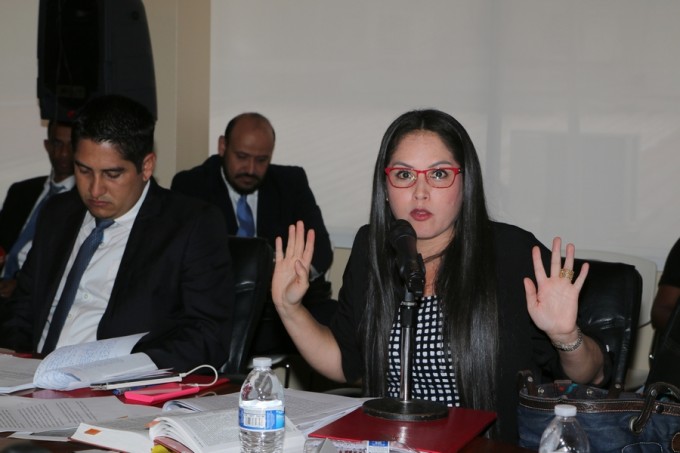
Ayú Prado wins a round, for strange reasons
by Eric Jackson
On March 16 the legislature dismissed eight criminal complaints against the Supreme Court’s presiding magistrate, José Ayú Prado, along with a 40-page report on these cases by one of the committee’s members, deputy Zulay Rodríguez Lu (PRD – San Miguelito). All eight complaints were variations on the same matter, allegations that Ayú Prado acted illegally in removing a Colon juvenile court judge, Juan Domingo Ibarra. Ibarra was suspected of accepting bribes to free youths accused of serious crimes, but no such case against him has been proven or even formally alleged by prosecutors. The Ibarra affair pits the high court’s supervisory role over lower tribunals against the concept of judicial independence. Most probably the committee’s decision was also something of a legislative referendum on Rodríguez’s reputation among her colleagues.
The committee found that the complaints did not contain proofs of the elements of a crime. That’s not a remarkably wrong conclusion, but the use of that standard to dismiss the complaints is controversial. In effect the committee was voting on whether to begin an investigation. The decision was not based on whether there was probable cause to begin an investigation, but whether the complaint contained the full proofs needed to convict. It was in part a back door revival of the infamous summary proof rule, which holds that no criminal investigation may commence against a public official unless complete and competent proof that a crime has been committed and that the official accused committed it, and moreover requires that any investigation done without such summary proof attached to an accepted complaint bars any investigation of the matter. But of course, to have the required summary proof to attach to the complaint the person making the complaint or somebody on his or her behalf would generally have had to investigate the matter at least enough to get that proof.
One of the dismissed allegations against Ayú Prado was that he used a forged criminal case file against Ibarra to get other magistrates to support him in removing the judge, when actually there was no such case. If there is probable cause to allege that, it would seem easy enough to investigate and find out if such a purported set of documents was shown around. But that would get the legislature into inquiring about the conduct of the high court’s daily business, arguably in violation of the constitutional separation of powers.
Rodríguez used to be an alternate judge, and in that role also at one time functioned as a de facto clerk for the Supreme Court. She was forced off of the bench — amidst never-confirmed rumors of US Embassy pressures — for letting some Colombian drug suspects out of jail on bail. In Panama, thanks largely to US “War on Drugs” urging, there is no bail for drug offenses. Since her election to the National Assembly in 2014 Rodríguez has been known both for her emotional rows with colleagues and for her railing against foreigners, particularly Venezuelans and Colombians, the latter whom she broad-brushed characterized as “scum.” Within a fragmented PRD that seems to have lost all unifying principles, she and her xenophobic politics have become one of the forces with which to reckon. She has many fervent supporters, but within the legislature she is the subject of much fear and loathing. That may not be a huge liability, as for many years polls have consistently shown the National Assembly to be one of the most hated of public institutions. In its February 2016 poll, Dicther & Neira found only 27 percent of those surveyed with a positive view of the legislature, against 68 percent expressing a negative opinion about the institution. The vote to dismiss the complaints about Ibarra were eight in favor with Rodríguez abstaining, so it might leave her in a position to say that she stood alone against a corrupt legislature and garner some substantial public support by doing so.
Still before the committee are seven more complaints about Ayú Prado, both for his actions on the court and for acts allegedly committed from before that time, when he was attorney general under Ricardo Martinelli. The three newest complaints, all filed this month, are about alleged abuses of power in a series of firings and arrests for corruption in one of the lower courts. Those would present some of the same problems as in the Ibarra matter. Then there are a couple of rather straightforward cases, which would be easy enough to investigate and prove if the committee doesn’t invoke some supposed rule or policy against investigations. One, against Ayú Prado and two colleagues, is about abuse of the high court’s travel funds. The other, from when Ayú Prado was attorney general, is about him allegedly ordering the destruction of evidence in a wiretapping case. There is a case in which it is alleged that the presiding magistrate and eight colleagues unanimously but unconstitutionally approved the deportation of a French citizen. And the then there are the two most far-reaching and explosive cases, one alleging that Ayú Prado was a conduit for Ricardo Martinelli’s presidential interference in court cases and the other that as attorney general Ayú Prado used threats to alter testimony about Martinelli’s alleged insider trading activities that are part of the much broader Financial Pacific brokerage firm scandal.
~ ~ ~
The announcements below are interactive. Click on them for more information










